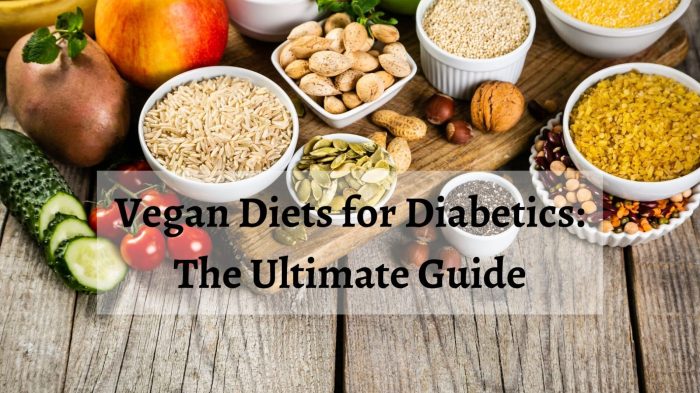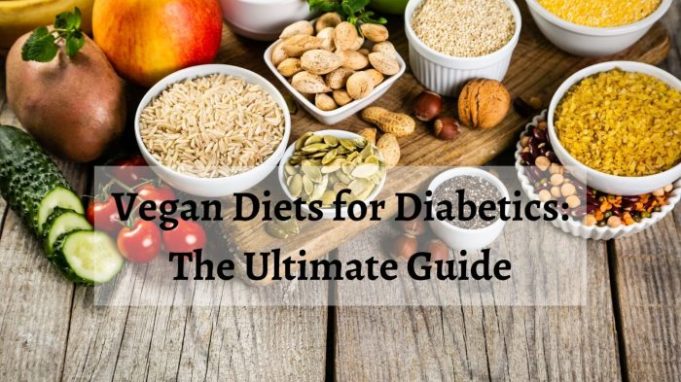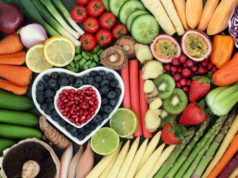Is vegan diet good for diabetics? This question has become increasingly relevant as more people embrace plant-based lifestyles and seek healthier alternatives for managing diabetes. While a vegan diet can offer numerous benefits for diabetics, understanding its potential impact on blood sugar control and nutritional needs is crucial. This article explores the intricate relationship between veganism and diabetes, delving into the benefits, challenges, and considerations for individuals navigating this dietary path.
A vegan diet, which excludes all animal products, can significantly alter a person’s dietary intake, particularly concerning macronutrients. While a traditional diet often relies heavily on animal protein and saturated fats, a vegan diet emphasizes plant-based sources of protein, fiber, and healthy fats. This shift in macronutrient profiles can influence blood sugar levels, potentially offering advantages for managing diabetes.
Understanding Diabetes and Veganism
Diabetes is a chronic condition that affects how your body regulates blood sugar. When you eat, your body breaks down food into glucose, which is your body’s main source of energy. Insulin, a hormone produced by the pancreas, helps glucose get into your cells to be used for energy. In people with diabetes, either the pancreas doesn’t produce enough insulin, or the body can’t use the insulin it produces effectively, leading to high blood sugar levels.
Understanding the relationship between a vegan diet and diabetes requires a deep dive into the nuances of both. Let’s explore the different types of diabetes, the nutritional makeup of a vegan diet, and how these aspects intertwine.
Types of Diabetes
Diabetes is broadly classified into two main types:
- Type 1 Diabetes: This type is an autoimmune disease where the body’s immune system mistakenly attacks and destroys the insulin-producing cells in the pancreas. This results in the body’s inability to produce insulin, making it necessary for people with Type 1 diabetes to take insulin injections throughout their lives.
- Type 2 Diabetes: In this type, the body either doesn’t produce enough insulin or can’t use it properly. This is often associated with lifestyle factors like obesity, physical inactivity, and genetics. Unlike Type 1, the pancreas still produces some insulin, but it’s not enough to regulate blood sugar effectively. Over time, Type 2 diabetes can lead to insulin resistance, where the cells become less responsive to insulin.
Nutritional Components of a Vegan Diet
A vegan diet is a plant-based eating pattern that excludes all animal products, including meat, poultry, fish, eggs, and dairy. Vegan diets typically emphasize whole, unprocessed foods such as fruits, vegetables, legumes, grains, nuts, and seeds. Here’s a breakdown of the key nutrients found in a vegan diet:
- Protein: Vegan diets can provide adequate protein from sources like legumes (beans, lentils, chickpeas), tofu, tempeh, nuts, and seeds. It’s important to consume a variety of these protein sources to ensure a balanced intake of essential amino acids.
- Fiber: Vegan diets are naturally high in fiber, which is found in abundance in fruits, vegetables, legumes, and whole grains. Fiber plays a crucial role in regulating blood sugar levels, promoting satiety, and supporting digestive health.
- Vitamins and Minerals: While vegan diets can be rich in many vitamins and minerals, some nutrients may require careful attention. These include vitamin B12, which is primarily found in animal products, and calcium, which can be obtained from fortified plant-based milk alternatives, leafy green vegetables, and fortified foods.
Macronutrient Profiles of Vegan and Traditional Diets
Macronutrients are the essential nutrients that provide energy to the body. These include carbohydrates, protein, and fat. Here’s a comparison of the macronutrient profiles of a typical vegan diet and a traditional diet:
| Macronutrient | Typical Vegan Diet | Traditional Diet |
|---|---|---|
| Carbohydrates | Higher | Lower |
| Protein | Lower | Higher |
| Fat | Lower | Higher |
A typical vegan diet tends to be higher in carbohydrates and lower in protein and fat compared to a traditional diet. This is due to the abundance of fruits, vegetables, and whole grains in vegan diets, which are rich in carbohydrates. However, it’s important to note that the specific macronutrient profile can vary widely depending on the individual’s dietary choices within a vegan lifestyle.
Blood Sugar Control and Vegan Diets
A vegan diet, which excludes all animal products, can be a beneficial approach for managing blood sugar levels, especially for individuals with diabetes. This is because plant-based foods tend to be lower in saturated fat and cholesterol while being rich in fiber, vitamins, and minerals that play a crucial role in blood sugar regulation.
The Impact of Vegan Diets on Blood Sugar Levels
A vegan diet can significantly influence blood sugar levels due to its unique composition. Plant-based foods, particularly those rich in fiber, can help slow down the absorption of sugar into the bloodstream, preventing rapid spikes in blood glucose levels. This is essential for individuals with diabetes, as it helps maintain stable blood sugar levels and reduces the risk of complications. Additionally, vegan diets often promote weight loss, which can further improve blood sugar control.
Vegan Foods for Blood Sugar Regulation
Several vegan foods are particularly effective in regulating blood sugar levels. These include:
- High-fiber foods: Legumes (beans, lentils, chickpeas), whole grains (brown rice, quinoa, oats), fruits (berries, apples, pears), and vegetables (broccoli, spinach, Brussels sprouts) are excellent sources of fiber, which helps slow down sugar absorption and stabilize blood sugar levels.
- Low-glycemic index (GI) foods: These foods release glucose slowly into the bloodstream, minimizing blood sugar spikes. Examples include non-starchy vegetables (cucumber, lettuce, tomatoes), legumes, and certain fruits like berries and grapefruit.
- Nuts and seeds: These are packed with healthy fats, fiber, and protein, which contribute to sustained energy levels and prevent blood sugar fluctuations. Examples include almonds, walnuts, chia seeds, and flaxseeds.
Research on Vegan Diets and Diabetes Management
Numerous studies have demonstrated the potential benefits of vegan diets for managing diabetes.
“A meta-analysis of 12 studies found that vegan diets were associated with a significant reduction in HbA1c levels, a marker of long-term blood sugar control, compared to omnivorous diets.” – The American Journal of Clinical Nutrition
“Another study published in the journal Diabetes Care found that individuals with type 2 diabetes who followed a vegan diet for six months experienced significant improvements in blood sugar control, insulin sensitivity, and weight loss.” – Diabetes Care
These findings suggest that vegan diets can be an effective dietary approach for managing blood sugar levels and improving overall health in individuals with diabetes.
Health Benefits of a Vegan Diet for Diabetics
A vegan diet, characterized by the exclusion of all animal products, offers potential health benefits for individuals with diabetes. This plant-based approach can contribute to better blood sugar control, weight management, and a reduced risk of cardiovascular disease, all crucial factors for diabetic health.
Weight Management, Is vegan diet good for diabetics
Maintaining a healthy weight is paramount for managing diabetes. Vegan diets, rich in fiber and low in calories, can aid in weight loss or weight maintenance. The high fiber content promotes satiety, keeping you feeling full for longer, which can help reduce overall calorie intake. Additionally, vegan diets typically contain less saturated and unhealthy fats, further contributing to weight management.
Reduced Risk of Cardiovascular Disease
Cardiovascular disease is a common complication of diabetes. Vegan diets can significantly reduce the risk of developing these complications. They are typically lower in saturated fat and cholesterol, key contributors to heart disease. Furthermore, vegan diets are rich in fruits, vegetables, and whole grains, providing essential nutrients that support heart health.
Improved Cholesterol Levels
High cholesterol levels are another risk factor for heart disease and can be a concern for individuals with diabetes. Vegan diets, often low in saturated fat and cholesterol, can help improve cholesterol levels. They are rich in soluble fiber, which binds to cholesterol in the digestive system, reducing its absorption into the bloodstream.
Examples of Vegan Meal Plans Suitable for Diabetics
Here are some examples of vegan meal plans suitable for diabetics:
- Breakfast: Oatmeal with berries and nuts, tofu scramble with vegetables, or a smoothie made with plant-based milk, fruits, and protein powder.
- Lunch: Lentil soup with whole-grain bread, a salad with grilled tempeh or tofu, or a veggie burger on a whole-grain bun.
- Dinner: Chickpea curry with brown rice, baked sweet potato with black beans and salsa, or pasta with marinara sauce and vegetables.
Nutritional Content of Vegan Foods Commonly Consumed by Diabetics
| Food | Calories | Protein (g) | Carbohydrates (g) | Fiber (g) |
|—|—|—|—|—|
| Lentils (1 cup cooked) | 230 | 18 | 40 | 15 |
| Tofu (1/2 cup) | 80 | 10 | 2 | 2 |
| Black beans (1 cup cooked) | 225 | 15 | 41 | 15 |
| Oatmeal (1/2 cup cooked) | 150 | 5 | 27 | 4 |
| Sweet potato (1 medium) | 180 | 2 | 40 | 4 |
Note: The nutritional content of foods can vary depending on the variety, preparation method, and serving size.
Challenges and Considerations

While a vegan diet can be beneficial for managing diabetes, it’s crucial to understand that it comes with its own set of challenges and considerations. It’s essential to navigate these aspects carefully to ensure the diet’s effectiveness and safety.
Consulting a Registered Dietitian or Healthcare Professional
It is highly recommended to consult with a registered dietitian or healthcare professional specializing in diabetes management before making significant dietary changes, particularly when transitioning to a vegan diet. These professionals can provide personalized guidance and support, considering individual needs and medical history.
Monitoring Blood Sugar Levels
Monitoring blood sugar levels regularly is vital for managing diabetes effectively. This is especially important when making dietary changes, as the body’s response to food can be affected. Regular blood sugar monitoring helps identify potential fluctuations and allows for timely adjustments to the diet or medication.
Adjusting the Diet as Needed
The vegan diet for diabetics requires constant evaluation and adjustment based on individual needs and blood sugar levels. For instance, if blood sugar levels are consistently high, the amount of carbohydrates in the diet may need to be reduced. Alternatively, if blood sugar levels are consistently low, the diet may need to be adjusted to include more complex carbohydrates or additional snacks.
Supplementation and Nutrient Considerations
A vegan diet, while rich in many nutrients, may lack certain essential vitamins and minerals crucial for overall health, particularly for individuals with diabetes. Therefore, it’s essential to understand the potential nutritional gaps and address them through appropriate supplementation.
Vitamin B12 Deficiency
Vitamin B12 is naturally found in animal products and is crucial for red blood cell production, nerve function, and DNA synthesis. Since vegan diets exclude animal products, individuals following this dietary pattern are at a higher risk of vitamin B12 deficiency. This deficiency can lead to fatigue, anemia, and neurological problems.
It is important to note that vitamin B12 deficiency can occur in individuals who do not consume animal products, even if they follow a well-planned vegan diet.
Iron Deficiency
Iron is an essential mineral for oxygen transport in the blood. While iron is present in plant-based foods, its absorption is lower compared to iron from animal sources. Additionally, individuals with diabetes may have a higher risk of iron deficiency due to factors like impaired iron absorption and increased iron loss.
Calcium Deficiency
Calcium is essential for strong bones, teeth, and muscle function. Although plant-based sources of calcium exist, such as leafy green vegetables and fortified plant milks, it’s important to ensure adequate intake to meet daily requirements.
Importance of Supplementation
Supplementation plays a crucial role in bridging the nutritional gaps in a vegan diet and ensuring adequate intake of essential vitamins and minerals. By supplementing with vitamin B12, iron, and calcium, individuals can meet their daily requirements and support overall health.
Vegan-Friendly Supplements for Diabetics
A wide range of vegan-friendly supplements are available to address nutritional needs for individuals with diabetes. These include:
- Vitamin B12 supplements: These are readily available in various forms, such as tablets, capsules, and sprays.
- Iron supplements: Vegan-friendly iron supplements are often derived from plant sources like spinach or ferrous gluconate.
- Calcium supplements: Calcium citrate and calcium carbonate are commonly used vegan calcium supplements.
- Other supplements: Depending on individual needs, other supplements may be recommended, such as vitamin D, omega-3 fatty acids, and magnesium.
It’s crucial to consult a healthcare professional or a registered dietitian to determine the appropriate dosage and type of supplements based on individual needs and health conditions.
Ultimate Conclusion
Navigating a vegan diet for diabetes requires careful planning, consultation with healthcare professionals, and a commitment to understanding individual needs. By incorporating nutrient-rich plant-based foods, managing blood sugar levels effectively, and addressing potential nutrient deficiencies, individuals can unlock the potential benefits of a vegan lifestyle while effectively managing their diabetes. This approach not only promotes better health outcomes but also empowers individuals to make informed choices about their dietary journey.
Expert Answers: Is Vegan Diet Good For Diabetics
Can a vegan diet cause hypoglycemia (low blood sugar)?
While a vegan diet can potentially lead to low blood sugar if not managed properly, it’s important to note that hypoglycemia is more likely to occur in individuals with type 1 diabetes who rely on insulin. A well-planned vegan diet that includes regular meals and snacks, along with blood sugar monitoring, can help prevent hypoglycemia.
Are vegan protein sources sufficient for diabetics?
Yes, vegan protein sources like legumes, tofu, tempeh, and seitan can provide adequate protein for diabetics. It’s essential to ensure a balanced intake of protein from various sources to meet individual needs.
How do I ensure adequate vitamin B12 intake on a vegan diet?
Vitamin B12 is not found in plant-based foods, so supplementation is crucial for vegans. Consult with a healthcare professional to determine the appropriate dosage for your needs.
What are some tips for managing blood sugar levels on a vegan diet?
Focus on low-glycemic index foods, prioritize fiber-rich options, and incorporate regular physical activity into your routine. Regularly monitor your blood sugar levels and adjust your diet as needed.
A vegan diet can be beneficial for managing diabetes, as it’s often low in saturated fat and high in fiber. But it’s important to remember that managing diabetes involves more than just diet, and it’s crucial to consult with a healthcare professional.
Speaking of diet, you might be curious about the history of diet drinks, like when did diet coke come out ? It’s fascinating how diet options have evolved over time, and understanding their history can help us appreciate the advancements in the food industry.
Ultimately, focusing on a balanced and healthy diet, alongside regular exercise and medical supervision, is key to managing diabetes effectively.
A vegan diet can be beneficial for managing diabetes, as it often includes plenty of fiber and low-glycemic foods. But navigating a plant-based lifestyle can feel overwhelming. If you’re looking for delicious and easy recipes that can help you embrace a healthier way of eating, check out the how not to diet cookbook.
This resource is packed with inspiring recipes and practical advice for making sustainable dietary changes, which can be particularly helpful for those with diabetes.
Whether a vegan diet is good for diabetics is a complex question, as it depends on individual needs and how the diet is managed. Some studies suggest potential benefits, while others highlight potential risks. A related question that often arises is whether diet soda fits into a ketogenic diet, and you can find more information on that topic here: is diet soda keto.
Ultimately, the best approach for managing diabetes involves consulting with a healthcare professional and tailoring your diet accordingly.
























